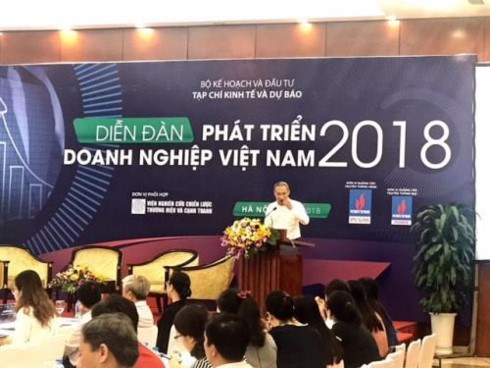Tuan made the remark at the 2018 Vietnam Business Development Forum held in Hanoi on June 19 by the Economy and Forecast Review and the Ministry of Planning and Investment.
According to Tuan, many businesses reported that the working attitude of staff members at authorized agencies has become friendlier and enthusiastic, while informal expenses reduced from 66 percent to 59 percent in 2017.
    |
 |
|
At the 2018 Vietnam Business Development Forum |
He also pointed out that many business conditions, specialized inspections and unreasonable regulations have been removed by authorized agencies, providing more favorable conditions for enterprises.
At the same time, the VCCI official pointed out several problems that need prompt actions, one of which is the shrinking average size of private enterprises coupled with their weak competitiveness amidst integration and rising competition.
He cited experts’ assessment that the “health” of private enterprises in general has not shown any remarkable improvement.
The private sector also lags behind other economic sectors in terms of participation in national export activities and export performance.
Tuan added that private enterprises still face many unfavorable business conditions, for example stricter requirements on workshop area, specialized equipment, management personnel and capital in some fields than those applied to foreign-invested counterparts.
Moreover, management agencies tend to require greater budget contribution by the private sector, thus tax continues to be a burden on private enterprises, he said.
Addressing the forum, Phan Duc Hieu, deputy director of the Central Institute for Economic Management (CIEM), said Vietnam must climb 28 more steps on the word business environment rankings in order to achieve the target set in the Government’s Resolution 19, despite the country’s strong rise in the ranking last year.
He went on to stress that besides improvement of the business environment, what really matters is to create breakthroughs in providing substantive support for enterprises, which requires resolve and consistent efforts of the Government, local administrations, ministries and agencies.
Tran Thi Hong Minh, Director of the Business Registration Management Department under the Ministry of Planning and Investment, reported at the forum that the business registration process had been shortened to 12 working days in 2017, down 12 days compared to 2016. At present, it takes an average 2.36 working days for provincial administrations to grant a business registration while the regulated duration is three days. As many as 40 provinces complete the procedure for only two days.
In the first five months of this year, a total of 52,322 new enterprises joined the economy, up 3.5 percent from the same period last year. The figure for 2017 is 127,000, compared to more than 110,000 in 2016.
Source: VNA